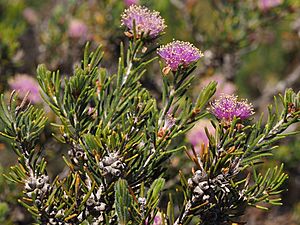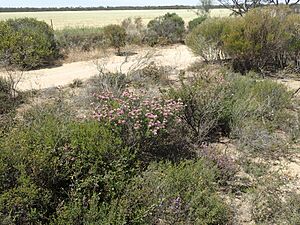Melaleuca wonganensis facts for kids
Quick facts for kids Melaleuca wonganensis |
|
|---|---|
 |
|
| Melaleuca wonganensis foliage, flowers and fruit | |
| Scientific classification | |
| Genus: |
Melaleuca
|
| Species: |
wonganensis
|
The Melaleuca wonganensis is a type of shrub that stands upright. It belongs to the Myrtaceae family, also known as the myrtle family. This plant is special because it is found only in the south-western part of Western Australia.
This shrub has thin leaves and beautiful purple or deep mauve flowers. You can only find it growing in the Wongan Hills area.

Contents
What Does Melaleuca wonganensis Look Like?
This Melaleuca shrub usually grows to be about 1 to 1.4 meters (3 to 4.5 feet) tall. Its leaves are arranged in an alternating pattern along the stem. They are long and narrow, sometimes shaped like a tear-drop.
The leaves are quite small, about 7.5 to 20 millimeters (0.3 to 0.8 inches) long. They are also very thin, only about 0.8 to 1.4 millimeters (0.03 to 0.06 inches) wide. Often, these leaves have tiny hairs and three lines running along them.
Flowers and Fruit
The flowers of Melaleuca wonganensis grow in round clusters, like little balls. These clusters are about 25 millimeters (1 inch) wide. They appear near the ends of the branches. Each cluster has two to five smaller groups of flowers, with three individual flowers in each group.
You can see these lovely purple or deep mauve flowers in September and October. Inside each flower, there are bundles of stamens, which are the parts that produce pollen. There are five bundles, and each bundle has seven to ten stamens. The bottom part of the flower is a bit hairy.
After the flowers, the plant produces woody fruits. These fruits are called capsules. They are small, about 3 to 4.5 millimeters (0.1 to 0.2 inches) long and wide.
Where Does Melaleuca wonganensis Come From?
The scientific name Melaleuca wonganensis was first officially given in 1999. This was done by a scientist named Lyndley Craven. He wrote about it in a scientific journal called Australian Systematic Botany.
The second part of its name, wonganensis, tells us where the plant is found. It refers to the Wongan Hills area in Western Australia.
Where Can You Find Melaleuca wonganensis?
This special Melaleuca plant grows only in the Wongan Hills district of Western Australia. It likes to grow in low areas, especially near salt lakes. It prefers soils that contain calcium carbonate, which is a type of lime.
You can find it in thick scrub or heathland. It grows in sandy soil, or sandy soil mixed with clay and small laterite rocks. Sometimes, it grows on sand over granite and laterite. One time, a plant was found on "gently rolling land, east of the hills, in orange clayey sand with many laterite pebbles. It was part of a Melaleuca heath-thicket by the side of the road, and there were many of them in that spot."
Is Melaleuca wonganensis Safe?
The Government of Western Australia's Department of Parks and Wildlife has looked at Melaleuca wonganensis. They have decided that it is "not threatened." This means it is not currently in danger of disappearing.
Images for kids


